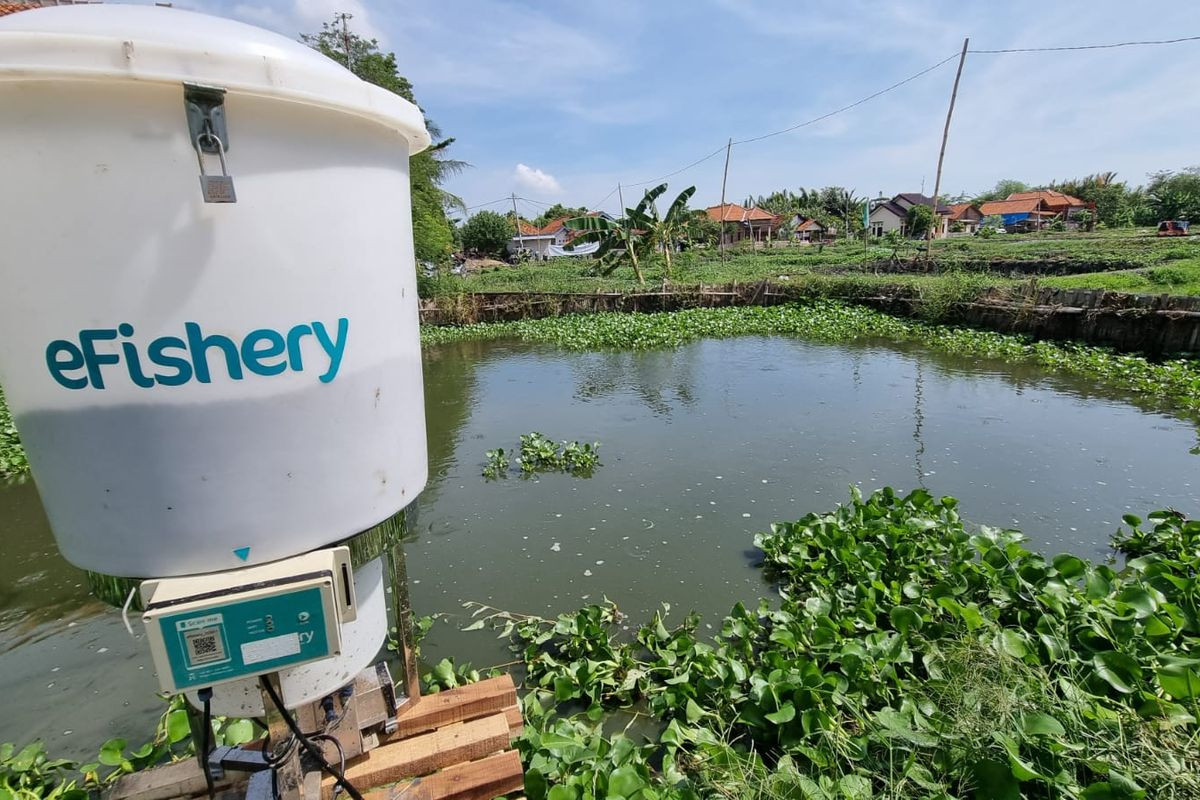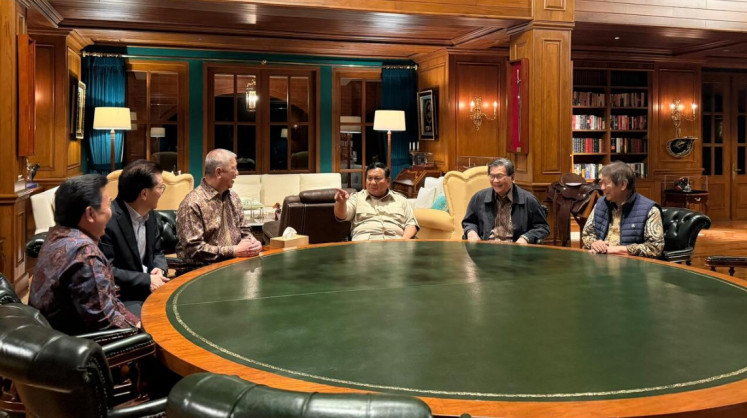Popular Reads
Top Results
Can't find what you're looking for?
View all search resultsPopular Reads
Top Results
Can't find what you're looking for?
View all search resultsIndonesian start-ups: When valuations eclipse innovation
Priotizing valuations over building real value pumps up hype while undercutting innovation, research and development as well as sustainable solutions, benefiting VC firms as founders, employees and communities lose out.
Change text size
Gift Premium Articles
to Anyone
I
ndonesia’s start-up ecosystem has garnered extraordinary attention over the past decade, with billions of dollars flowing into ventures across e-commerce, agritech, fintech and other technology-driven fields.
Enthusiasts hail this surge as proof of a new era of innovation, complete with the emergence of so-called unicorns.
Yet beneath these celebratory headlines lies a more sobering reality: Venture capital (VC) firms often enjoy substantial financial gains even when the start-ups they support experience severe setbacks or engage in unethical conduct. Meanwhile, the founders, employees and communities involved can be left grappling with outsized risks and losses.
A telling example can be found in the case of aquaculture start-up MarinaTech, which pledged to revolutionize fish and shrimp farming by offering automated feeding systems and data analytics. A regional VC fund called Cosmos Group poured significant sums into MarinaTech between 2020 and 2023, rapidly elevating its valuation to the billion-dollar range.
Initially, many observers applauded MarinaTech for exemplifying the newfound dynamism of Indonesia’s start-up scene; its purported technology touted as the future of aquaculture in Southeast Asia. However, subsequent investigations discovered serious financial discrepancies, pushing MarinaTech’s top executives to resign.
Employees who had believed in the company’s grand promises suddenly faced mass uncertainty, but Cosmos Group’s ultimate financial exposure remained remarkably low. This outcome stemmed largely from the core structure of VC funding, which hinges on two primary revenue streams: management fees and carried interest.
A hypothetical venture capital fund of US$140 million often sets aside 10 percent for administrative costs: legal, compliance and operational. In many cases, however, the investable amount is further constrained by an additional 2 percent management fee assessed over 10 years, amounting to $2.8 million annually.
Over the fund’s full lifespan, that adds up to $28 million in guaranteed fee income (Gompers & Lerner, 2004). The result is that only around $98 million ($140 million minus $14 million for administration and $28 million in fees) is truly available to invest in start-ups.
Now consider a single investment within this fund: MarinaTech, which receives $30 million across three rounds of $10 million each.
Suppose MarinaTech accounts for 10 to 20 percent of the total portfolio, in which case 10 to 20 percent of the fund’s annual $2.8 million in management fees, or some $280,000-560,000, could be attributed specifically to this start-up. Over 10 years, that slice alone reaches $2.8 million-5.6 million in fee income tied solely to MarinaTech’s position, regardless of how the company performs.
Moreover, if MarinaTech achieves a $1.4 billion valuation with the fund retaining a 3 percent stake ($42 million in value) after dilution, the original $30 million principal would yield a net profit of $12 million.
With a typical 20 percent carried interest, fund managers would collect an additional $2.4 million from MarinaTech’s success. This amount in carried interest would be on top of the $2.8 million-5.6 million in fees specifically attributed to the start-up, not to mention the rest of the fund’s $28 million in total fees across all portfolio companies.
Crucially, if MarinaTech fails due to mismanagement or fraud, employees and founders could lose everything, but the VC firm would still have collected years of fees on the fund, including a pro rata share tied to the start-tup.
In short, the fund’s structure insulates VC managers through guaranteed income, even when portfolio companies implode, while offering strong upside potential if an investment soars. This framework often shifts disproportionate risk onto founders, workers and local partners while ensuring the VC firm locks in steady compensation from the start.
This protective framework also materializes in other highly publicized sectors. Indonesia’s e-commerce industry exemplifies this pattern, with many companies deploying massive promotions and discount campaigns to swell user numbers.
For a while, these expansions can enthrall investors who see rising metrics as evidence of unstoppable growth. In reality, many e-commerce start-ups have limited capacity for genuine innovation, fail to develop sustainable product pipelines or merely replicate services that already exist.
Nevertheless, VC money pours in, driven by the excitement around scaling quickly and seizing market share. When conditions shift – for instance, if consumers tire of heavily subsidized deals or a global economic downturn reduces available funding – founders scramble to stay afloat, employees bear the brunt of layoffs and communities see few lasting benefits, such as stable jobs or improved supply chains. VC firms, shielded by ongoing management fees and the option to cash out early, frequently escape substantial financial pain.
In this environment, founders can fall prey to what some describe as “valuation fever”: They may feel compelled to inflate key performance metrics or overlook potential flaws in their business models, all to secure the next funding round on better terms. Meanwhile, investors hungry for a success story may overlook early warning signs, an issue referred to as “investor blindness”, in the hope of profiting from an eventual exit.
Once a start-up’s internal problems surface, employees and loyal supporters who had believed the hype can be devastated by lost wages, shattered career prospects and wasted effort.
This paradoxical dynamic has broader implications for Indonesia’s start-up ecosystem. On the one hand, venture capital has undeniably fostered groundbreaking progress in sectors such as AI-driven healthcare, digital education and microfinance solutions for underserved demographics. On the other hand, when hype overshadows the pursuit of true resilience, critical elements like research, product refinement or capacity building in local manufacturing can be underemphasized.
E-commerce expansions capture headlines by announcing millions of users gained, seemingly overnight, yet many of these enterprises never develop the logistical or technological backbone required for long-term sustainability. The end result is a cycle in which short-term “wins” are heralded while lasting value to society and the economy remains questionable.
For all its promise, Indonesia’s start-up boom thus presents a stark paradox. Allegations of fraud, governance failure or unsound business fundamentals can topple fledgling enterprises, but VC investors frequently retain substantial protections built into their fund models.
Nevertheless, observers maintain that heightened accountability and realigned incentives could nurture a healthier ecosystem in the long run. More stringent oversight, combined with a genuine commitment to building strong corporate structures and meaningful product innovation, would help ensure that hype and inflated valuations do not overshadow the pursuit of enduring solutions.
If the entrepreneurial community places greater emphasis on long-range planning and transparent reporting, the country may unlock the developmental benefits that many envisioned at the onset of its tech-driven renaissance.
Excessive focus on valuation undercuts real innovation while pouring resources into pumped-up numbers distracts from careful research and development and genuine problem-solving; work that could advance industries and benefit local communities.
Ultimately, lasting entrepreneurial success hinges on building real value. Start-ups that aim for tangible milestones and social contributions are more likely to withstand market volatility, preserve jobs and avoid dramatic collapses that primarily hurt those without the financial safety net afforded to venture capitalists.
***
The writer is an alumnus of Harvard Business School and an affiliate alumnus of the MIT Sloan School of Management.











